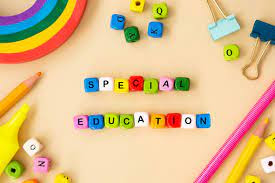Introduction-
Need for Special Education:
The
present statistics suggest that there are one billion children living with a
disability worldwide which is around 15% of the entire world’s population. And
taking into account the 2019 ‘State of the Education Report for India: Children with Disabilities, there are
78,64,636 children experiencing some form of disability in India constituting
2.2 % of the total population of children in the country. Among the PwD age
group of 15 years & above, only 19.3% had a secondary level of education
and from the age of 3 to 35, only 10% went to the preschool intervention
program.
 |
| Image credit Hindustan Times |
The WHO had also estimated that in some countries including India, being disabled more than doubles the chance of never enrolling in school. One in three out-of-school children is known to have a disability and it is very disappointing to see a large number of dropouts of students with disabilities because of various reasons like inaccessibility, lack of required resources, and social discrimination.
These
studies highlight the major concerns regarding the education of children with
disabilities and this clearly signifies the importance of introducing a special
measure to educate the population of specially-abled children that constitutes
a significant number in society and this makes it rather a need to make them
well-educated. This also increases the importance of learning the Sign language
along with basic subjects to be able to communicate better and ultimately help
them to be well educated and work in favor of their personal growth as well as
for the betterment of the society.
Some important pivots of the policy-
1. Gender equality, equity, and inclusion
2. Specifically trained teachers
3. Barrier-free access to education to
everyone
4. More accessible resources
5. Introducing new techniques and measures to
impart knowledge
6. Better security measures and new
assessment criteria
7. Comfort and ease of learning
8. Self-paced, flexible curriculum to harness
their talents and support their special needs.
9. Providing equitable access to higher
learning opportunities
10.
Provision of resources, funds, and the tools to make all aspects of education
and school activities accessible.
Measures taken in the direction-
The
NEP 2020, which has been approved by the Union Cabinet this year, also takes
into consideration several important dimensions of the RPWD Act 2016 that were earlier
neglected. ‘The Inclusive Education as a
system of education is stressed upon wherein students with and without
disabilities learn together.’ The main goal of this policy is to ensure
universal access to high-quality education even for children with special needs
or Divyang by providing them special attention and priority and giving them
equal opportunities and quality education as any other child. The foundation of
the act is to bridge the gap between various groups of people and communities
and strengthen existing measures.
Talking about the tools-
In
order to make this new addition to the NEP possible, certain new technologies
and tools have been designed. Assistive devices, language appropriate
teaching-learning materials like textbooks in accessible formats such as large
print and Braille are also made available to these children. This policy helps
in identifying the unique capabilities of each student and promotes their
holistic development in both academic and non-academic spheres.
Appointment of Special Educators
Under
the NEP 2020, various schools and universities appoint special teachers who are
trained to teach such students using the resources provided by the government.
Separate funds are also generated to make the environment of the teaching
institutes favorable and to cater to the educational needs of students with
severe or multiple disabilities. The assessment of these individuals had also
been on a much different level including new guidelines so as to provide them
equitable access to higher education. Even a certain percentage of reservations
is there in various fields and institutes for the specially-abled. Apart from
imparting theoretical knowledge, it is also ensured that these children get
equal exposure and convenience to have practical knowledge and involve in
extracurricular activities and sports that along with helping them to learn and
grow, also spreads awareness about the issue and make other people empathize
and understand the importance of treating everyone equally.
Open and Distance Learning (ODL) Programmes are also being offered by the
National Institute of Open Schooling
(MIOS) and Special Education Zones (SEZs)
to meet the learning needs of children with benchmark disabilities, who are
unable to attend a physical school daily.
The
recent changes in the policy also takes into consideration the dropout rates
and also address children in vulnerable situations like victims of trafficking
or child beggars and orphans in addition to those with disabilities, making it
easier and more accessible for them to get a proper education.
Various
officials like Arman Ali, Executive Director, NCPEDP emphasized the
education of such children and urged them to include them in regular schooling.
The execution and implementation of the provisions in the NEP are monitored by
authorities and NGOs who are working to safeguard disability rights.
Conclusion-
The
awareness of the importance of special education and the ways to teach children
with specific disabilities had become an important part of the education system
and programs. These reforms are sure to help children with disabilities and
increase access to quality education, employment, health, and all the other
services and help in making them aware of their basic rights and make their
life better. The importance of special education lies in changing the mindset
of people and empowering the specially-abled individuals and those from
socio-economic disadvantaged backgrounds, particularly including females and
transgender individuals or people from Scheduled castes and tribes and other
minorities, and to improve their position as independent and educated people
than just a secluded part of the society. The NEP, to a great extent, has been
efficient in recognizing the challenges faced by certain groups in society and
inculcating knowledge in them and better allocation of resources by
implementing effective measures.




No comments:
Post a Comment